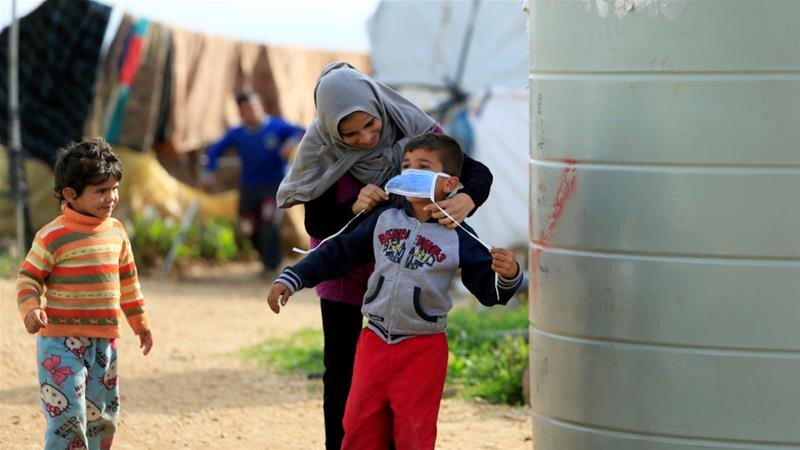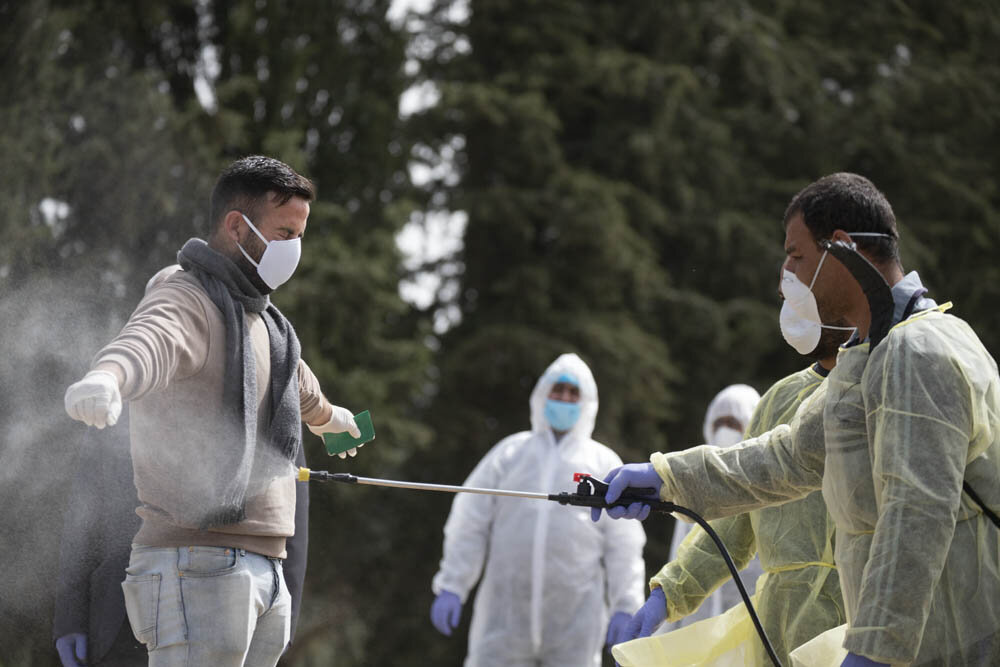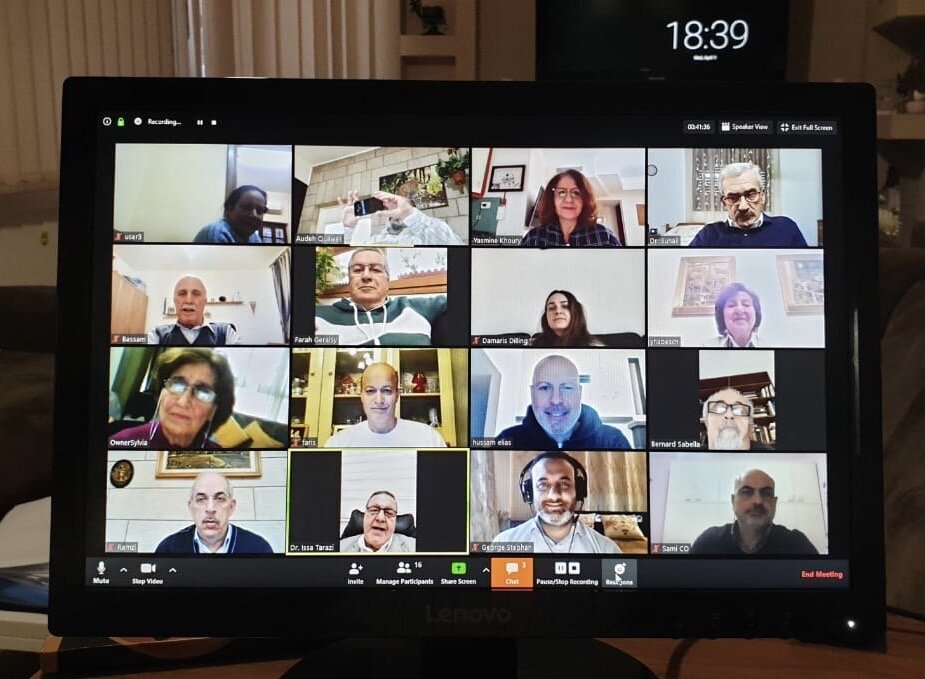DSPR updated report on COVID-19 in the Middle East




As we approach Holy Week we are all reminded that staying at home is the safest way to celebrate our faith and to ensure that our traditions, communal prayerful rites and rituals would be sustained for years to come. Many of us at DSPR have been invigorated by the Services and Hymns on social media networks by our various faith communities. From the Pope’s exceptional prayer with his blessing for the City and the World to Hymns sung by the Greek Orthodox Mount of Lebanon Choir to the Middle East Council of Churches and the World Council of Churches statements and prayers which offered hope and solidarity. The Heads of Churches in Jerusalem and throughout the region have issued statements of support and solidarity with the faithful and the People of God particularly as we are approaching Holy Week. They have asked the faithful to stay at home and to carry on with the prayers and traditions of the Holy Week inside the family with the help of social media. We are thankful for the positive vibes coming out from our spiritual leaders and also from our esteemed partners who did not fail us during the last month with their statements, messages and personal enquiries after us and our beneficiaries.
DSPR in most areas remain locked down with the exception of the Gaza main offices which remain operational despite the 10 cases of coronavirus in the Strip. All other staff are working from home and we communicate with each other constantly. The situation is worrisome not only in the Gaza Strip where only 60 ventilators are available for a population of 2 million but also in the West Bank where 205 ventilators are available for a population of over 2.5 million. The Palestinian health system is under duress and is reaching a critical point. This is the reason behind the strict closures imposed this time by Palestinian police and law enforcement agencies of the Palestinian Authority. The major problem confronting the Palestinians now are the returning workers from Israel with some of them carrying the virus. There are not enough tests to go around in spite of the fact that the Health Ministry has conducted more than 5,600 tests already. Democratic Senators Elizabeth Warren from Massachusetts and Van Hollen from Maryland had asked Secretary of State Pompeo to provide coronavirus aid to the Palestinian Territories.
In Jordan, Prime Minister Omar Razzaz announced yesterday the establishment of a Coronavirus Relief Fund ‘The Nation’s Effort’ in order to institutionalize the donation process and to ensure sound management. This Fund is intended for the deposit of large donations and it targets the 200,000 families adversely affected by the virus. The Ministry of Health needs to combat the virus are also included as well as the Ministry of Social Development in order to support and follow up with those families directly affected and the families of day laborers who lost income. Jordan continues with a strict lockdown and the government declared Friday a complete shutdown for 24 hours, thus preempting any mass gatherings for religious purposes.
In Lebanon, the government continues with the full shutdown of the country. A decision was taken to bring back the Lebanese expatriates, estimated at over 20,000, between April 5 and April 12. Priority for return is given to the elderly, those needing medical attention and to those who cannot overstay their short visas in other countries. Lebanon continues to suffer from economic woes which are likely to further distress the situation of hundreds of thousands of impoverished families and those who lost their wages because of the virus.
In Israel according to Dr. Nihaya Daoud, who is a senior public health lecturer at Ben Gurion University of the Negev, there are disquieting discrepancies between the services offered to the Israeli public at large and to the Arab communities in Israel. Lack of testing, the stigma of infection and the overall lower socioeconomic conditions and overcrowding of Arab families in Israel are reasons for concern that the rather low number of those Arab-Israelis infected, 38 or less than 1% of all Israel infections, is quite misleading. There is real fear that a major outbreak of the virus is imminent in the Arab community of Israel. As a result of the efforts of Arab Knesset members a first drive in testing station was activated in Tamra, an Arab Galilee town, day before yesterday. The station is supposed to move on to other Arab population centers. This, however, remains lacking as the Ministry of Health has failed to include even one professional Arab member in its Emergency preparedness committee. Arab doctors and medical professionals in Israel remain at the forefront of the fight against the virus in Israeli hospitals and specialized clinics. The Jewish Orthodox communities are not heeding the instructions of the government and there is real fear that the infected in their numbers will continue to grow and could jeopardize the efforts of the government to contain the virus.
There is also concern that the period for staying at home could become too long and could result in a variety of problems, including psychological, violence against women and inability to cope with children, especially for families accustomed to a different way of life. No one is immunity from the ill effects of home confinement and already some have been discussing how best to cope with the psychosocial impact of long in-home confinement. There is growing attention to the need to provide risk free environments, as much as possible, for people working in the field and participating in community efforts to help medical staff, police and other agencies bent on helping out the population. This is being considered by DSPR but we need to develop this further in order to ensure that all of us prescribe to the same set of rules as we venture into the different communities.
On DSPR News, we have worked collectively to come up with the Covid-19 DSPR ACT Alliance Global Appeal.
https://actalliance.org/?post_type=appeals_r_r_funds&p=12569&preview=true
We are hoping that we will be able to garner the needed support in order to contribute to the efforts of alleviating the ill effects on the most impoverished and vulnerable families in our midst.
We are hoping that we will be able to garner the needed support in order to contribute to the efforts of alleviating the ill effects on the most impoverished and vulnerable families in our midst. We continue to hold meetings and in-house consultations via Zoom, which has gained popularity in recent weeks due to its usefulness as a meeting venue. There is worry on some privacy issues related to vulnerability of Zoom to hackers; the Zoom administrators are aware of this and are constantly monitoring the situation. We find Zoom meetings as helpful. The latest of our meetings was on Wednesday, April 1st with the Members of our Central Committee, the five Executive Directors and Central Office Staff.
DSPR: Department For The Service Of Palestinian Refugees
